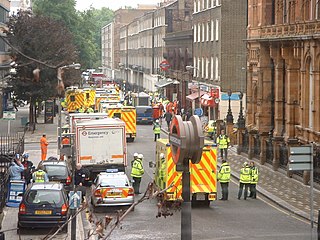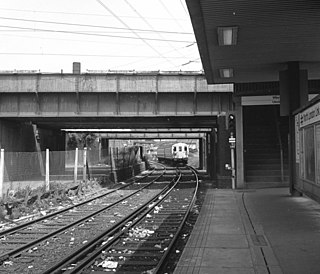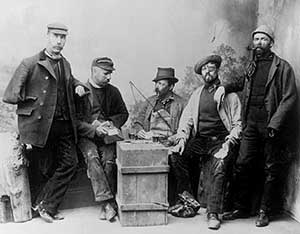
The 7 July 2005 London bombings, also referred to as 7/7, were a series of four coordinated suicide attacks carried out by Islamic terrorists in London that targeted commuters travelling on the city's public transport system during the morning rush hour.
On Thursday, 21 July 2005, four attempted bomb attacks by Islamist extremists disrupted part of London's public transport system as a follow up attack from the 7 July 2005 London bombings that occurred two weeks earlier. The explosions occurred around midday at Shepherd's Bush, Warren Street and Oval stations on the London Underground, and on London Buses route 26 in Bethnal Green on Hackney Road. A fifth bomber dumped his device without attempting to set it off.
Yasin Hassan Omar is a British Somali convicted terrorist. Omar was arrested and tried for his involvement in the attempted 21 July attacks on London's public transport system. He was found guilty of attempting to detonate a device on the London Underground Victoria line tube train between Warren Street and Oxford Circus tube stations. In August 2005 police gave his age as 24 after his arrest.
The Territorial Support Group (TSG) is a Met Operations unit of London's Metropolitan Police Service (MPS) which specialises in public order policing, amongst other specialist areas. In 2012 it consisted of 793 officers and 29 support staff. The TSG is a uniformed unit of the MPS that replaced the similarly constituted Special Patrol Group in 1987. TSG units patrol the streets of London in marked police vans or "carriers"; using the call sign prefix "Uniform". Generally each carrier has an advanced (police) driver, seven constables and a sergeant. Territorial Support Groups often comprise three carriers, twenty one constables, and three sergeants reporting to an Inspector. They separately patrol designated areas experiencing serious levels of gang violence or disorder. When deployed, it is by the MPS Information Room. Due to the public order nature of their role often numerous carriers will be assigned. TSG officers can be identified as TSG from the distinctive "U" in their shoulder numbers. Some TSG officers are also plain clothes officers, carrying a taser and handcuffs.

Peter Michael Imbert, Baron Imbert, was Commissioner of the Metropolitan Police Service from 1987 to 1993, and prior to that appointment Chief Constable of Thames Valley Police from 1979 to 1985.
The Wood Green ricin plot was an alleged bioterrorism plot to attack the London Underground with ricin poison. The Metropolitan Police Service arrested six suspects on 5 January 2003, with one more arrested two days later.
The 2004 financial buildings plot was a plan led by Dhiren Barot to attack a number of targets in the U.S. and the United Kingdom which is believed to have been approved by al-Qaeda. The evidence against the plotters consisted of home videos, written notes, and files on computers. At the time of the arrests the group had no funding, vehicles, or access to bomb-making equipment.
This is a list of deliberate attacks on the infrastructure, staff or passengers of the London Underground that have caused considerable damage, injury or death.

On 29 June 2007, in London, two car bombs were discovered and disabled before they could be detonated. The first device was left near the Tiger Tiger nightclub in Haymarket at around 01:30, and the second was left in Cockspur Street, located in close proximity to the nightclub.

The Glasgow Airport attack was a terrorist ramming attack which occurred on 30 June 2007, at 15:11 BST, when a dark green Jeep Cherokee loaded with propane canisters was driven at the glass doors of the Glasgow Airport terminal and set ablaze. The car's driver was severely burnt in the ensuing fire, and five members of the public were injured, none seriously. Some injuries were sustained by those assisting the police in detaining the occupants. A close link was quickly established to the 2007 London car bombs the previous day.

The Bishopsgate bombing occurred on 24 April 1993, when the Provisional Irish Republican Army (IRA) detonated a powerful truck bomb on Bishopsgate, a major thoroughfare in London's financial district, the City of London. Telephoned warnings were sent about an hour beforehand, but a news photographer was killed in the blast and 44 people were injured, with fatalities minimised due to it occurring on a Saturday. The blast destroyed the nearby St Ethelburga's church and wrecked Liverpool Street station and the NatWest Tower.
Alternative theories have been proposed regarding the Oklahoma City bombing. These theories reject all, or part of, the official government report. Some of these theories focus on the possibility of additional co-conspirators that were never indicted or additional explosives planted inside the Murrah Federal building. Other theories allege that government employees and officials, including US President Bill Clinton, knew of the impending bombing and intentionally failed to act on that knowledge. Further theories allege that the bombing was perpetrated by government forces to frame and stigmatize the militia movement, which had grown following the controversial federal handlings of the Ruby Ridge and Waco incidents, and regain public support. Government investigations have been opened at various times to look into the theories.

The 2006 transatlantic aircraft plot was a terrorist plot to detonate liquid explosives, carried aboard airliners travelling from the United Kingdom to the United States and Canada, disguised as soft drinks. The plot was discovered by British Metropolitan police during an extensive surveillance operation. As a result of the plot, unprecedented security measures were initially implemented at airports. The measures were gradually relaxed during the following weeks, but passengers are still not allowed to carry liquid containers larger than 100 ml onto commercial aircraft in their hand luggage in the UK and most other countries, as of 2023.

A crisis actor is a trained actor, role player, volunteer, or other person engaged to portray a disaster victim during emergency drills to train first responders such as police, firefighters or EMS personnel. Crisis actors are used to create high-fidelity simulations of disasters in order to allow first responders to practice their skills and help emergency services to prepare and train in realistic scenarios as part of full-scale disaster exercises.

On 3 June 2017, a terrorist vehicle-ramming and stabbing took place in London, England. A van was deliberately driven into pedestrians on London Bridge, and then crashed on Borough High Street, just south of the River Thames. The van's three occupants then ran to the nearby Borough Market area and began stabbing people in and around restaurants and pubs. They were shot dead by Metropolitan Police and City of London Police authorised firearms officers, and were found to be wearing fake explosive vests. Eight people were killed and 48 were injured, including members of the public and four unarmed police officers who attempted to stop the assailants. British authorities described the perpetrators as "radical Islamic terrorists".

On 15 September 2017, at around 08:20 BST, an explosion occurred on a District line train at Parsons Green Underground station, in London, England. Thirty people were treated in hospital or an urgent care centre, mostly for burn injuries, by a botched, crude "bucket bomb" with a timer containing the explosive chemical TATP. Police arrested the main suspect, 18-year-old Iraqi asylum seeker Ahmed Hassan, in a departure area of the Port of Dover the next day, and subsequently raided several addresses, including the foster home of an elderly couple in Sunbury-on-Thames where Hassan lived following his arrival in the United Kingdom two years earlier claiming to be an asylum seeker.

The West Ham station attack was a bombing and shooting attack at West Ham station in east London on 15 March 1976. A 5 lb (2.3 kg) bomb on a Metropolitan line train exploded prematurely in the front carriage of the train, injuring seven passengers. The bomb detonated prior to reaching the City of London, where it was thought the intended target was Liverpool Street station at rush hour. Adrian Vincent Donnelly, a Provisional Irish Republican Army (IRA) member, then shot Post Office engineer Peter Chalk in the chest, and killed train driver Julius Stephen, who had attempted to catch him. Donelly exited the station to the street and threatened people with his revolver before PC Raymond Kiff caught up with him. Shouting "You English bastards!", Donelly shot himself in the chest, but he survived and was apprehended by Kiff.

Special Branch was a unit in the Metropolitan Police in London, formed as a counter-terrorism unit in 1883 and merged with another unit to form Counter Terrorism Command (SO15) in 2006. It maintained contact with the Security Service (MI5) and had responsibility for, among other things, personal protection of (non-royal) VIPs and performing the role of examining officer at designated ports and airports, as prescribed by the Terrorism Act 2000.










